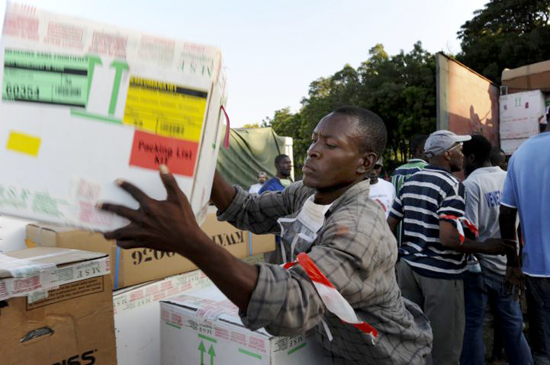
Haiti 2010 © Julie Remy
Staff in Port-au-Prince starts to unload materials for MSF's inflatable hospital; when complete, it will have two operating theaters and room for 100 beds.

MSF is providing surgical and first-aid assistance in several areas of Port-au-Prince and is assessing medical needs outside the capital as well. Click on the map for a full-page view of where MSF is curently working.
Doctors Without Borders/Médecins Sans Frontières staff in wards and operating theatres in Haiti are still working through very heavy caseloads while growing increasingly concerned about supply problems that threaten the welfare of patients. Drugs for surgical care, basic supplies for pre- and post-operative treatment, and equipment such as dialysis machines are urgently needed, but access problems for cargo shipments are causing delays in delivery.
Loris De Filippi, the coordinator for MSF's work in Choscal hospital in Cite Soleil, says the situation is dire: "Every time we go out of the operating theatre, we see faces imploring us for treatment. And they are begging us there in front of the hospital. It's a very unacceptable situation. What we are trying to do is to expand our capacity to answer these calls. But we need supplies to get to the airport—and we don't know why the planes are being re-directed."
In Carrefour hospital, Paul McMaster, a surgeon, says that the needs are all too obvious: "We've not been able to get the equipment we need in the hospital because of these delivery problems. We're running out. On Saturday we didn't have one of our anesthetists. We've run out of plaster of Paris for fractures and we've no crepe bandages at the moment. So it's just a nightmare to get these basic materials."
MSF is currently operating in a host of locations in and around the capital. More than 1,500 patients have received treatment at an MSF hospital in Martissant, to name just one, and 120 of them are receiving inpatient care. MSF recently began working in Port-au-Prince's General Hospital, where staff found a working dialysis machine and immediately began putting it to use. MSF's nephrology team carried out its first treatment on Monday and will expand their work when new dialysis machines arrive by road from the Dominican Republic. After numerous delays, the construction of an inflatable hospital has finally begun as well; when complete, it will have room for 100 beds and will house two operating theatres.
In Leogane, one of the hardest hit towns outside the capitol, a team is working in a nursing school where, prior to MSF’s arrival, the staff had been struggling to provide basic care. Another team in Leogane is preparing four surgical wards in what was a missionary hospital to accept the large number of referral cases in the area. In Jacmel, another battered town, an MSF team is performing surgery in the hospital's operating theater.




